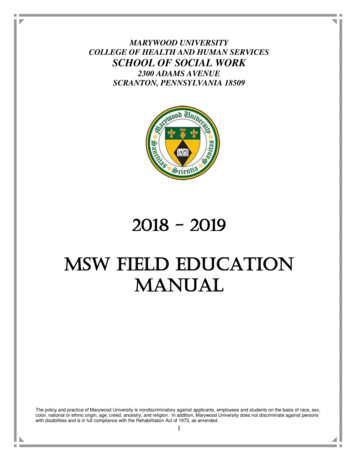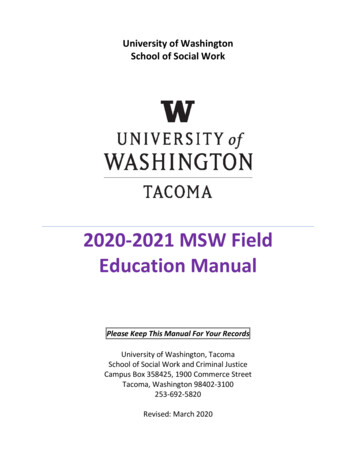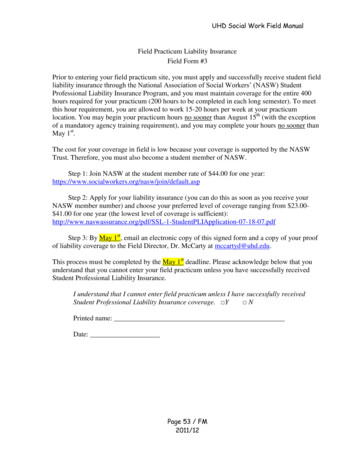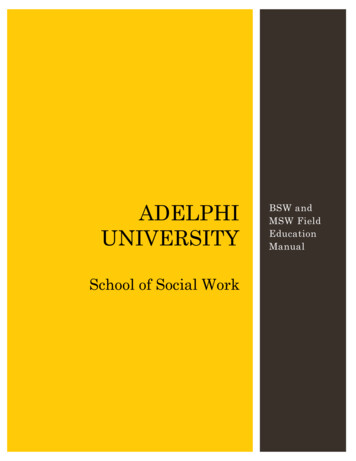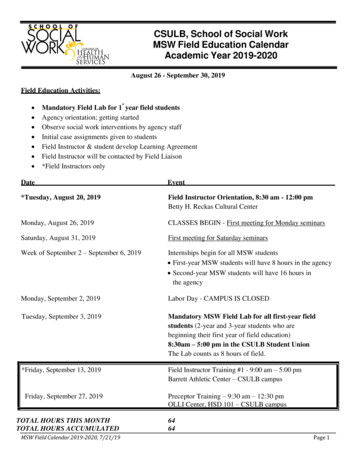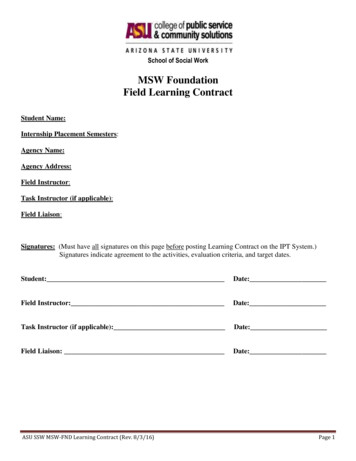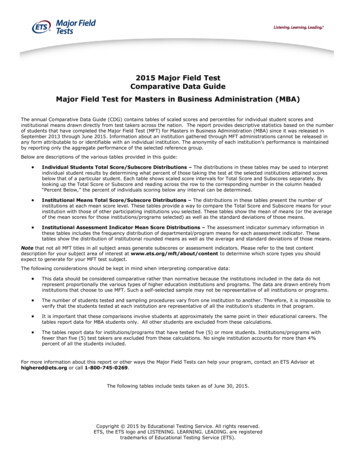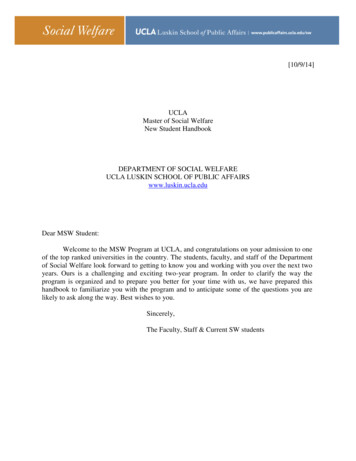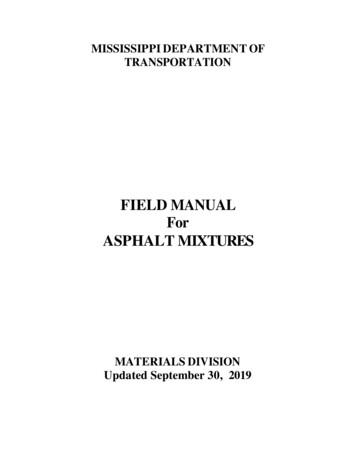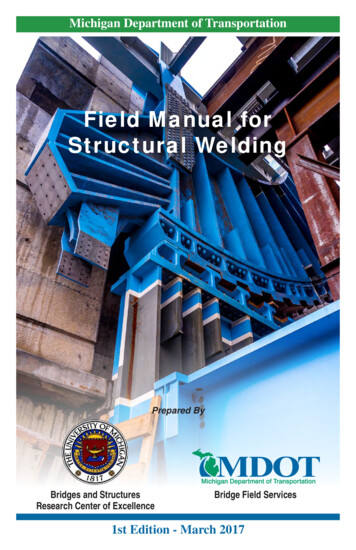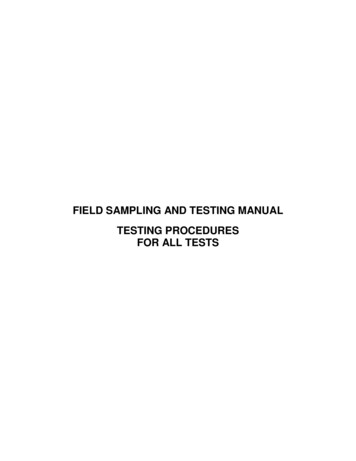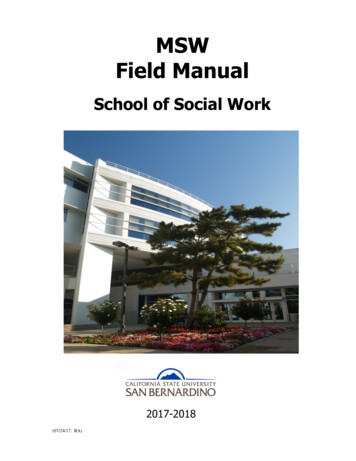
Transcription
MSWField ManualSchool of Social Work2017-2018(07/24/17: RA)
CSUSB School of Social WorkStudent Professional Field Commitment FormTo all social work students: Please complete and electronically sign thisform in IPT (Intern Placement Tracking system).Thank You.I have read and understand:1. Objectives of Field PracticumYesNo2. Sequence of Field ClassYesNo3. Roles and Responsibilities of Field StaffYesNo4. Roles and Responsibilities of Field InstructorYesNo5. Roles and Responsibilities of Field LiaisonYesNo6. Expectations for Field PerformanceYesNo7. Learning Plan Agreement FormYesNo8. Outcome EvaluationYesNo9. Grading Policies for Field PracticumYesNo10. Problem Solving ProcessYesNoIf you have marked ‘no’ to any of these areas, please make anappointment with the Director of Field Education to clarify anyconfusion. This form should be completed and signed in IPT by yoursecond week of field.Student SignaturePrint NameDate2
PURPOSEThis manual has been prepared to assist agencies, field instructors, faculty, and studentsin understanding the objectives, policies, and procedures governing the field practicumprogram for the Master of Social Work program at California State University, SanBernardino.The contents of this manual are based on best practices within the field of social workguided by the National Association of Social Workers (NASW) Code of Ethics, standardsoutlined through the Council on Social Work Education (CSWE), and policies specific tothe University and the School of Social Work. Manuals from several Southern CaliforniaGraduate Schools of Social Work (USC, CSULB, UCLA, and Sacramento StateUniversity) were reviewed to assist in the development of the Field Manual. Valuablesuggestions and information were also provided by past and current Department Chairs,faculty members, field instructors, liaisons, and MSW students.3
Table of Contents1.0 INTRODUCTION. 61.2 Accreditation Standard 2.2—Field Education . 62.0 ORGANIZATION OF THE MSW CURRUCULUM . 92.1 Foundation Curriculum (52 units) . 92.2 Advanced Curriculum (38 units) . 9For further information on the curriculum, refer to the Student Handbook. . 92.3 Special Projects/Programs . 93.0 FIELD PROGRAM OVERVIEW AND GOALS . 103.1 The Role of Field Instruction in Social Work Education . 103.2 Goals of the Field Work . 104.1 Social Work Student . 114.2 Director of Field Education . 124.3 Program Coordinator and Field Coordinator . 124.4 Field Sequence Committee . 124.5 Faculty (Field) Liaison . 134.6 Agency/Field Practicum Setting . 134.7 Field Instructor . 144.8 Preceptor . 154.9 Non-MSW Supervisor . 165.0 THE FIELD PROGRAM PURPOSE AND STRUCTURE . 165.1 Purpose. 165.2 Structure . 165.2.1 Placement Concurrent with Classes . 165.2.2 Student Involvement in Placement Choice . 175.2.3 Four Areas of Practice Experience . 176.0 ADMINISTRATIVE POLICIES AND PROCEDURES . 176.1 Orientation . 176.2 Confidentiality . 186.3 Practicum Hours. 186.3.1 Attendance and Punctuality . 206.4 Furloughs and Mandated Time Off. 206.5 Holidays . 206.6 Illness and Other Emergencies. 216.7 Insurance . 216.8 American Disabilities Act . 226.9 Criminal Background Checks (Live Scan) . 226.10 Immigration Status . 236.11 Safety . 236.12 Counseling . 236.13 Policy and Procedure for the Use of Employment Setting for Practicum . 236.14 Policy on the Use of the Same Agency for Both Years of Practicum . 256.15 Withdrawal from Field Practice Enrollment . 256.16 Student Request to Postpone or Quit a Field Placement . 254
6.17 Agency Dismissal of Students from Field Practice Sites and/or Field Seminar 266.18 Interruption of Field Work . 266.19 Grievances and Appeals . 277.0 PLACEMENT SELECTION PROCESS AND REQUIRED FIELDPRACTICUM COMPONENTS AND REQUIREMENTS . 277.1 Foundation Year Field Internships Application and Interview Process . 277.2 Advanced Year Field Internships Application and Interview Process . 297.3 Learning Plan Agreement . 317.4 Process Recordings . 327.5 Supervision . 327.6 Field Seminar . 337.7 Required Field Meetings . 337.8 Evaluations of Field . 347.9 Written Evaluations . 347.9.1 Performance Evaluation: Please use the following Key in evaluating yourstudents .357.9.2 Fall Quarter . 367.9.3 Winter Quarter . 367.9.4 Spring Quarter (Final Evaluation): . 367.9.5 End of Year Evaluations . 368.0 GRADE FOR FIELD . 378.10 Repeat Policy (Re: A Grade of No Credit (NC) in Field). 389.0 FIELD WORK AGENCY: PROCESS AND REQUIREMENTS. 409.1 Process for Placement Site Selection . 4010.0 .FIELD INSTRUCTOR CERTIFICATION TRAINING PROGRAM ANDCOMMUNICATION . 4210.1 Special Note to Agency Executives and Field Instructors . 4310.2 Orientation Checklist for Social Work Interns and Field Instructors . 435
1.0 INTRODUCTIONWelcome to the California State University, San Bernardino (CSUSB), Master of SocialWork, Field Practicum Program. This Field Manual has been developed to provideinformation and guidance to students, field instructors, program administrators andfaculty. It is not intended to be exhaustive and will continue to be revised and changed asneeded. The most current copy of the Manual will be maintained on the CSUSB Schoolof Social Work website.The field education program is a means to achieve the goals of the MSW Program atCSUSB. It is structured to meet the Accreditation Standards of the Council on SocialWork Education (2015, CSWE), in particular Standards 2.2- Field Education andAccreditation Standards (EPAS, 2015) nine Core Competencies.1.1 School of Social Work MissionCSUSB’s School of Social Work provides accessible, dynamic, and rigorous academicprograms that prepare students with foundation and advanced professional values,knowledge, and practice skills to effectively enhance the well-being of the diversepopulations and communities of our region, state, and world.1. Enhance social work educational opportunities for students within our region andin unserved areas through increasing accessibility and program completion,especially for first generation college students, students from the dynamicallyevolving ethnic communities in our region, and students in remote areas.2. Continually update curriculum and teaching practices with current research andbest practices reflective of the needs and trends of our region, nationally, andglobally.3. Offer and measure attainment of a competency-based, foundation and advancedlevel curriculum consistent with the needs of our area for practice skills withindividuals, families, groups, organizations, communities and the skills of policyadvocacy.4. Offer a curriculum that emphasizes practice consistent with the aims and values ofthe social work profession and that meets the needs of diverse, vulnerable, andunderserved populations, especially in our region.5. Support faculty in providing leadership to the profession and to the communitywith their research and expertise.1.2 Accreditation Standard 2.2—Field EducationThe program discusses how our field education program:6
2.10The program explains how its field education program connects thetheoretical and conceptual contributions of the classroom and fieldsettings.The program explains how its field education program provides generalistpractice opportunities for students to demonstrate social workcompetencies with individuals, families, groups, organizations, andcommunities and illustrates how this is accomplished in field settings.The program explains how its field education program providesspecialized practice opportunities for students to demonstrate social workcompetencies within an area of specialized practice and illustrates howthis is accomplished in field settings.The program explains how students across all program options in its fieldeducation program demonstrate social work competencies through inperson contact with clients and constituencies.The program describes how its field education program provides aminimum of 400 hours of field education for baccalaureate programs anda minimum of 900 hours for master’s programs.The program provides its criteria for admission into field education andexplains how its field education program admits only those students whohave met the program’s specified criteria.The program describes how its field education program specifies policies,criteria, and procedures for selecting field settings; placing andmonitoring students; supporting student safety; and evaluating studentlearning and field setting effectiveness congruent with the social workcompetencies.The program describes how its field education program maintains contactwith field settings across all program options. The program explains howon-site contact or other methods are used to monitor student learningand field setting effectiveness.The program describes how its field education program specifies thecredentials and practice experience of its field instructors necessary todesign field learning opportunities for students to demonstrate programsocial work competencies. Field instructors for master’s students hold amaster’s degree in social work from a CSWE-accredited program andhave 2 years post-master’s social work experience. For cases in which afield instructor does not hold a CSWE-accredited social work degreepractice experience. For cases in which a field instructor does not doesnot have the required experience, the program assumes responsibility forreinforcing a social work perspective and describes how this isaccomplished.The program describes how its field education program providesorientation, field instruction training, and continuing dialog with fieldeducation settings and field instructors.7
2.2.11The program describes how its field education program develops policiesregarding field placements in an organization in which the student is alsoemployed. To ensure the role of student as learner, student assignmentsand field education supervision are not the same as those of the student’semployment.Field education is the signature pedagogy for social work. The intent of field education isto integrate the theoretical and conceptual contribution of the classroom with the practicalworld of the practice setting. It is a basic precept of social work education that the twointerrelated components of curriculum—classroom and field—are of equal importancewithin the curriculum, and each contributes to the development of the requisitecompetencies of professional practice. Field education is systematically designed,supervised, coordinated, and evaluated based on criteria by which students demonstratethe Social Work Competencies. Field education may integrate forms of technology as acomponent of the program (CSWE, 2015).A competency-based approach refers to identifying and assessing what studentsdemonstrate in practice. In social work this approach involves assessing students’ abilityto demonstrate the competencies identified in the educational policy.Assessment of student learning outcomes is an essential component of competency-basededucation. Assessment provides evidence that students have demonstrated the level ofcompetence necessary to enter professional practice, which in turn shows programs aresuccessful in achieving their goals (CSWE, 2015).Competency-based education is an outcomes-oriented approach to curriculum design.The goal of the outcomes approach is to ensure that students are able to demonstrate theintegration and application of the competencies in practice (CSWE, 2015).CompetenciesCompetency 1: Demonstrate Ethical and Professional BehaviorCompetency 2: Engage Diversity and Difference in PracticeCompetency 3: Advance Human Rights and Social, Economic, and EnvironmentalJusticeCompetency 4: Engage In Practice-informed Research and Research-informed PracticeCompetency 5: Engage in Policy PracticeCompetency 6: Engage with Individuals, Families, Groups, Organizations, andCommunitiesCompetency 7: Assess Individuals, Families, Groups, Organizations, and CommunitiesCompetency 8: Intervene with Individuals, Families, Groups, Organizations, andCommunitiesCompetency 9: Evaluate Practice with Individuals, Families, Groups, Organizations, andCommunities8
2.0 ORGANIZATION OF THE MSW CURRUCULUM2.1 Foundation Curriculum (52 units)The Foundation curriculum builds on a liberal arts base, required for admission to theMSW program, to provide a common professional core for all students as well aspreparation for advanced study in the second half of the program. Initial foundationcourses cover the essential knowledge, values, processes and skills of generalist socialwork practice. They also introduce current issues in a range of fields of practice, thuspreparing students to make informed choices regarding specialized study in the secondyear. Student completes 12 units of field practicum (SW 608ABC) in the foundation yearof field practicum.2.2 Advanced Curriculum (38 units)After building on the Foundation generalist model, in the foundation year, students thenmove to consideration of Advanced practice in the second year. All students take boththe micro practice and the macro practice series of courses. In the fall, students choose aspecialization to which they will apply their advanced generalist micro and macropractice learning. Students take 12 units of field practicum (SW 608DEF) in theadvanced year of field practicum.For further information on the curriculum, refer to the Student Handbook.2.3 Special Projects/ProgramsThe School of Social Work at CSUSB has two specialized stipend programs that areadministered through the California Social Work Education Center (a.k.a. CalSWEC) anda Distance Education Program called Pathway Distance Education Program.1.The Title IV-E program provides financial support to MSW studentspreparing for a career in public child welfare. Title IV-E refers to aregulation under the Social Security Act that pertains to the provisions ofservices to foster children. The Title IV-E Project Coordinator at CSUSBadministrates this program and is also responsible for placing studentsreceiving Title IV-E funds in their field practicums. These placementsmust be in a public or private non-profit agency that serves children infoster care and/or children at risk for removal from their families becauseof abuse or neglect. More detailed information can be found on the Schoolof Social Work website.2.With the passage of Proposition 63 in 2004 (a.k.a. Mental Health ServicesAct), another stipend program was implemented under the administrativestructure of CalSWEC. In conjunction with the California Department ofMental Health, stipends are awarded to students who are preparing for acareer working in a county mental health services agency. The stipends9
are only granted to full-time, advanced-year MSW students. Studentsmust be placed in a county public mental heal
Graduate Schools of Social Work (USC, CSULB, UCLA, and Sacramento State University) were reviewed to assist in the development of the Field Manual. Valuable suggestions and information were also provided by past and current Department Chairs, faculty members

